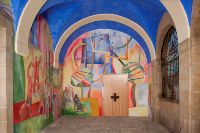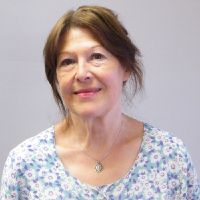Katy Hounsell-Robert from the Basque Country
The tiny village of Antezana de Foronda in the green countryside of the Basque country has only 100 inhabitants but its sixteenth-century church St Michael the Archangel has made news headlines by undergoing a miraculous transformation from a dull neglected space into a palace illuminated from floor to ceiling with vibrant biblical and historical murals.
Four years ago St Michael's very existence was threatened by a possible extension to nearby Vitoria airport but with grim persistence the villagers succeeded in averting this. Then the Mayor Jose Luis Alonso had the idea of making it into a lively place of religious worship and pilgrimage where art, music, dance and other events could take place. He asked Xavier Egana, a Franciscan friar well known for his church murals and exhibitions in Spain, Germany and South America to lead the project.
When people, including the bishop, were initially sceptical about the viability of the project Egana painted the portico walls with a colourful picture of a local fiesta, with people carrying the Virgin of Armola, dancing and playing traditional instruments, as a taste of what was to come. This convinced everyone to get on board with the project. It has taken several years of hard work involving the whole village, who have put up scaffolding, cleaned and prepared surfaces and supplied and carried the silicon paints.
Egana's interpretation of Biblical events is simple and devotional. He paints lively narrative scenes in beautiful colours so that everyone can appreciate them on different levels. He uses allegory and symbolism to tell the stories – a horse knocking down a man in the street represents St Paul’s conversion, for example. Now the scaffolding has come down, the paint has dried and last St Stephen's Day a packed audience, wrapped warmly in heavy coats, scarves and gloves, sat enjoying a classical concert there to celebrate this rebirth of spiritual, religious and social life.
Now the scaffolding has come down, the paint has dried and last St Stephen's Day a packed audience, wrapped warmly in heavy coats, scarves and gloves, sat enjoying a classical concert there to celebrate this rebirth of spiritual, religious and social life.
Egana now 73, has refused any payment. When he finished the work he observed: “My intent was not to preach but to inspire reflection. I hope this becomes a spiritual space where anyone of any religion or any faith can contemplate the mysteries of life.”
On a wing and a prayer
While art has always been part of the religious life it is unusual for football to be associated with nuns, although a few have been known to kick a ball about within the convent walls. However a little while ago the Poor Clare Sisters of St Clare’s convent in Guernica were surprised and gratified one day when Marcelo Bielsa the then coach of Athletic Bilbao called on the sisters with his wife Laura. He is Argentinian and a devout Catholic, greatly inspired by his aunt who is a nun. They talked seriously over tea and cake and Bielsa asked the nuns if they would pray for him and the team. He insisted they watch the next match against Osasuna Pamplona and he would put up a banner saying “hello” to them.
The Mother Superior Maria Teresa Gerrikabeitia, said: “We are not great soccer fans and couldn't watch the match as it was on pay-to-view but we listened on the radio. We found him and his wife, a lovely couple, and we prayed for him.” The referee had the banner taken down, but Athletic still beat Osasuna Pamplona 3-1 and had a very successful season initially. Then results began to slide, Bielsa’s contract was not renewed and he moved on at that point to Marseille. But the sisters still pray for him and keep in touch.
Abortion bill
The Bishops in the Basque country were deeply troubled when the Spanish Socialist government passed a law in 2010 making it legal in Spain for a woman over 16 and up to 14 weeks of pregnancy to have an abortion. Pro-life marches took place in Bilbao and Madrid and Catholic MPs who voted in favour were banned from Communion.
In 2014 the Bishop of San Sebastian, Jose Ignacio Munilla, said “We cannot accept over 4,000 abortions a year in the Basque country – mainly teenage girls,” and released a new pastoral letter which he later presented to Pope Francis during an ad limina visit to the Vatican. He rejected the argument that defended abortion as a woman’s “right to choose”: “Behind every abortion there is always poverty, loneliness, pressure from family members. Women are often subjected to male chauvinist pressure to have sex – women are the second victims of abortion.”
A new centre was opened in San Sebastian to advise women on problems with unwanted pregnancies. Under pressure from the Church and pro-life movements the next new conservative Popular Party (PP) government affirmed their pledge to protect the right to life of the baby in the womb and introduced a bill restricting abortion to rape cases and requiring two doctors in separate clinics to certify that a failure to abort would damage the woman’s mental or physical health.
Women’s organisations took to the streets to protest. Hundreds of women travelled from the Basque country to Madrid to join other pro-choice demonstrators. May Serrano the leader of the organisation “Imperfect Women” in Bilbao joined her colleague Yolanda Dominguez, a leading activist in Madrid, in a demonstration registering their bodies at the local government commercial offices, symbolically claiming their bodies as their own.
“We are saying, ‘If you don’t treat us as real people but as objects then okay, we’ll go to the commercial registry office and have our bodies officially denominated as ‘property’,” explained Domínguez. The radical Femen group surrounded the Archbishop of Madrid as he was entering a church, chanting the slogan “Abortion is sacred”.
The PP was divided on the issue and abandoned its attempts to change the 2010 law. As in so many countries, the abortion argument still divides the Basque country.
For all previous Tablet World dispatches click here



 Loading ...
Loading ...
What do you think?
You can post as a subscriber user ...
User comments (0)